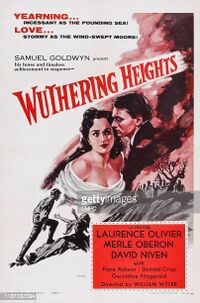Wuthering Heights: Difference between revisions
(Created page with "==Relevance== In answer to the question:<br> "Are you moved to tears very easily?"<br> Morrissey replied:<br> <blockquote> "Yes, very, very easily. As a very dull example......") |
No edit summary |
||
| (2 intermediate revisions by one other user not shown) | |||
| Line 1: | Line 1: | ||
[[Category:Influences on Morrissey - Literature]] | |||
[[Category:Influences on Morrissey - Film and Television]] | |||
[[File:Wuthering Heights poster.jpg | 200px | right | thumb |Wuthering Heights]] | |||
==Relevance== | ==Relevance== | ||
In answer to the question:<br> | In answer to the question:<br> | ||
"Are you moved to tears very easily?"<br> | "Are you moved to tears very easily?"<br> | ||
Morrissey replied:<br> | Morrissey replied:<br> | ||
<blockquote> | <blockquote> | ||
| Line 8: | Line 10: | ||
</blockquote> | </blockquote> | ||
([https://illnessasart.com/2020/12/24/q-april-1994/ Q Magazine], April, 1994) | ([https://illnessasart.com/2020/12/24/q-april-1994/ Q Magazine], April, 1994) | ||
{{Page | {{Page | ||
|DiscogsArtistId= | |DiscogsArtistId= | ||
|WikipediaPageTitle=Wuthering_Heights_(1939_film) | |WikipediaPageTitle=Wuthering_Heights_(1939_film) | ||
}} | }} | ||
Latest revision as of 18:15, 18 February 2023
Relevance
In answer to the question:
"Are you moved to tears very easily?"
Morrissey replied:
"Yes, very, very easily. As a very dull example... the film Jane Eyre I sat through by accident a couple of years ago and was shocked that the floodgates opened. I'm extremely sensitive to art and I'm not ashamed to say that Jane Eyre or Wuthering Heights or The Well Of Loneliness stir within me very powerful passions, but that doesn't mean that I'm an ineffectual six-stone weakling and the suggestion irks me constantly."
(Q Magazine, April, 1994)
Wikipedia Information
 |
Wuthering Heights is a 1939 American romantic period drama film directed by William Wyler, produced by Samuel Goldwyn, starring Merle Oberon, Laurence Olivier and David Niven, and based on the 1847 novel Wuthering Heights by Emily Brontë. The film depicts only 16 of the novel's 34 chapters, eliminating the second generation of characters. The novel was adapted for the screen by Charles MacArthur, Ben Hecht and John Huston (uncredited). The supporting cast features Flora Robson and Geraldine Fitzgerald. The outdoor scenes were filmed in Thousand Oaks, California, with scenes shot in Wildwood Regional Park and at the current site of California Lutheran University. The film won the 1939 New York Film Critics Award for Best Film. It earned nominations for eight Academy Awards, including for Best Picture, Best Director and Best Actor. The 1940 Academy Award for Best Cinematography, black-and-white category, was awarded to Gregg Toland for his work. Nominated for original score (but losing to The Wizard of Oz) was the prolific film composer Alfred Newman, whose poignant "Cathy's Theme" does so much "to maintain its life as a masterpiece of romantic filmmaking." In 2007, Wuthering Heights was selected for preservation in the United States National Film Registry by the Library of Congress as being "culturally, historically, or aesthetically significant".
